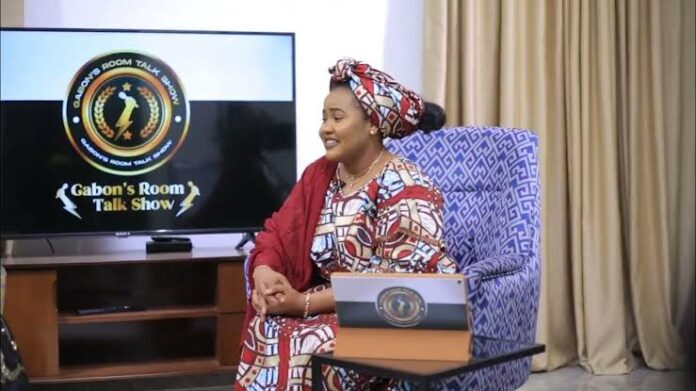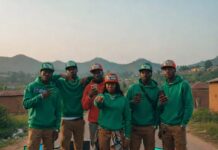A Crack On Hadiza Gabon’s Wall: Humanizing Northern Nigeria Stories by Sa’id Sa’ad
Being a lover of reality shows, award nights, behind-the-scenes and documentary movies, I’d always dabbled from one interview to another, especially exclusive interview rooms that humanize celebrities from various industries. Something that often allows me to see these people beyond their screen-portrayed selves, beyond their polished English-speaking tongues in sets, and their filtered pictures on Instagram.
From Steve Harvey’s show to Trevor Noah’s. From Cofee with Karan to dozens of international shows of the same make-up. Each of them has always fed me the dose of vitamins I needed, to see different fantastic interviewees in their human form. Sometimes, I would wonder deeply how one person could have this widened divergent existence.
However, in Nigeria, shows like #WithChude hosted by Chude Jideonwo have become relevant to Nigeria’s entertainment industry, bringing Music Artists and Actors – Nollywood – to Live through personal exclusive discussions that spark varying conversations. Meanwhile, the advent of Ebuka Obi Uchendu’s Black Box Interviews has presented a new dimension for this art. Through bringing similar personalities as #WithChude’s, the Black Box interviews – geared by Ebuka’s mastery in media and moderation makes it more humane, deep – yet story-driven and intense conversations that would take about fast-phased 2-hour discussion that would leave you wanting more. Undoubtedly, these contents have been the source which news media and bloggers would often plug their ‘stories’ and ‘gossip’ from, giving more relevance to the celebrities and promoting their art. And above all, selling the stories of these people, majorly, using it to their career advantage.
READ ALSO: Kannywood actress, Aisha Humaira credits success to Dauda Rarara, fights off jealous critics
As you might already predict, Northern Nigeria’s entertainment industry has lagged same platforms, except for a few interview programmes produced by media companies. BBC Hausa’s Daga Bakin Mai Ita and Arewa24’s Kundin Kannywood are a few examples of what it was for the industry. Perhaps – as perceived by many – a lack of “capacity” or “interest” to pursue the same, especially from the industry players. Or rather, others believed that as a result of the notion that northerners do not appreciate northern content. The latter, as sad as it may sound has continued to place a border-line between contents from the region and its market, however, a robust attempt – from the industry players as thus they benefit from it – would have been a Noah’s Ark to what northern Nigeria’s storytelling would become, and even the industry market. Hence, Hadiza Gabon’s Room.
Since the advent of the show – as much as hardly ever skipped Daga Bakin Mai Ita – I am one of those who’ve watched every episode of Hadiza Gabon’s Room since its inception. Being a household name in northern Nigeria, Hadiza Gabon’s Room, a personal show produced by the actress lately has gained attraction in the region. This should raise an eyebrow as to how northerners react to northern content or stories, specially produced in Hausa. Before the production, the most likely, perhaps consistent programme that ‘tries’ to do this task of humanizing the northern entertainment artists has been Daga Bakin Mai Ita which of course contributed, though very shallow. Another, close ally to that was what used to be Kundin Kannywood, produced by Arewa24 – the first indigenous Hausa-speaking TV channel – and hosted by ace Kannywood actor, Aminu Sheriff Momo. With the wider reach and technical skills invested to produce them, the dhas proven-oven ttoa lighter foundation of sustainability as thus, they are running, produced and aired by media organizations who might – at any moment – halt, pause or terminate the programme, especially if any of the episode’s attempt to wobble with the organization’s reputation. But one would never separate celebrities and trends. Or can we?
I am one of those who held the same notion of; “northern Nigeria does not appreciate northern Nigerian content” due to my experiences with middle-class-elites northern Nigerians – in Hausa-speaking northern Nigeria – who find their faces wrapped in shame to consume anything northern, or anything Hausa. Be it music, film or any form of art. But even more, sometimes you could drop your jaw at how much northerners “dismiss” what becomes of Hausa celebrities from the region. Many were caught “bragging” about how much they didn’t recognize a certain northern celebrity they bump into at a shopping mall.
But this is not so much different from what the same generation of Yoruba and Igbo does to their indigenous language promoters and contents as well. Perhaps the only difference between the Hausa-consuming northern Nigerian population and the others is that the typical educated middle-class or elite half-baked exposed northerner consumes Hausa-producing contents with ‘Shame’. While a Yoruba or Igbo population consumes these contents in their languages with ‘Pride’. Unless for few who are bold hit the table, some have made it a subject of mockery to their friends who listens to Hausa songs or watch Hausa movies. Making it a “measure of exposure”.
Ordinarily, I’d assume that only a few people like myself – who are interested in storytelling and care about northern stories – consume Hadiza Gabon’s Room, until a few weeks ago when the host – Hadiza Gabon – interviewed a Kannywood actress who’d broke down on the show over what people would describe as “poisonous love” with another unnamed artist. This brought numerous comments from different people in the industry and beyond. But most surprising, from the same “typical educated middle-class or elites half-baked exposed northerners”, admitting to having “been watching” the show. Perhaps this can reflect the hypocritical denial and intentional lack of acknowledgement. So, it’s safe to say, these two contributed to placing the region’s storytelling where it is. Maybe even moved it farther.
Now, self-made analysts on social media have been placing the show on a scale weighing Hadiza Gabon’s skills in media or journalism, and some even going to the extent of breaking bits and pieces of how the questions should be asked. In all honesty, it is not balanced, to completely dismiss the fact that there is still more to do from the producer in terms of the technicalities of the show, but it is also imperative to understand that Shows like these grow, get better and improve with time. This could be reflected in what Ebuka Obi Uchendu or Chude Jideonwo’s shows were ten years ago and what they are now.
However, as a writer and a communications specialist, I would rather than analyse, admit that Hadiza Gabon would have become one of the bravest from northern Nigeria’s entertainment industry to self-produce such funnel that would feed – good or bad – stories from what creatives do in northern Nigeria. At least, a good or bad story is better than no story. Or better still, if Ebuka’s Black Box Interview Show could tell deeply personal stories about the life, career journey and even growth of certain entertainment stars from other parts of Nigeria, then there is the likelihood that Hadiza Gabon could be to northern Nigeria celebrities what Ebuka Obi Uchendu is to Nigerian Celebrities.
Though balancing stories is an essential part of storytelling, it is also unimaginable to think that one day you would find Chude Jideonwo interviewing Hamisu Breaker or Ado Gwanja on his show. This is not to be dismissive about the possibility of that, but the prospect as of now is blurry. Therefore, these stories from these people from northern Nigeria have to come out from northern Nigeria. And that is why, Hadiza Gabon should be commended for that.
On the other side, celebrities have soon produced multiple of these shows – using their popularity to sell their stories – while putting a spotlight on their artists, storytellers, entrepreneurs, writers, tech gurus and even educators. And like tomatoes spread out on the front line of an open market, these have been central to the stories they tell the world about themselves. Since we refused to do the same, we are left with our favourite dou “almajiri and poverty” narratives.
Imagine if Hadiza Gabon’s Room is a Live show, where these guests will speak – without filters, editing or CUT!? Such that truth will be told as raw as it should be and the eyes will communicate a lie? Imagine if other writers and journalists will consistently write about whatever in-creatives-sake is coming out from northern Nigeria in theatre, movie, and music such as Muhsin Ibrahim? Imagine if there are multiple consistent shows produced by the industry players who’d use their popularity to air their stories such as what Hadiza Gabon does in her Room? Imagine if, consuming these contents in local languages is seen as mere “interest” rather than as a “measure of exposure”? Imagine! Imagine! Imagine!
This is a crack created by Hadiza Gabon’s Wall. We have now seen the gap. And there is more to see. Storytelling does not rest on the edge of a singular art form. Rooms as well, have ways of speaking. They have walls that portray. They have a roof that reflects. They have floors that nurture. We can only humanize our stories when we hang them on the walls and paint them. But what will become of us if our walls continue to crack?
Sa’id Sa’ad is a Nigerian writer, poet and playwright from Maiduguri. He is the NFC Essay Award Winner 2018 and the Peace Panel Short Story Prize Winner 2018. He tweets at @saidsaadwrites and can be reached via email at saidsaadabubakar@gmail.com
Follow the Neptune Prime channel on WhatsApp:
Do you have breaking news, interview request, opinion, suggestion, or want your event covered? Email us at neptuneprime2233@gmail.com





